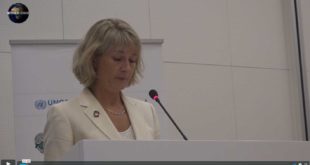On the topic of fish crime, we hear from Mr Jon Whitlow from the international transport workers international and he enlightens us about how the media try to hide certain topics from us and bring others to light. Fish crime has been an issue for many years and attention must be paid. The criminal issues of fish crime ask if we do have enough criminal punishment for the problem of fish crime.
Illegal fishing is a key contributor to overfishing yet despite significant effort worldwide to date to stem illegal fishing it has continued unabated. It is estimated that each year between USD 11 and 23.5 billion is lost to illegal fishing, the majority of fish being stolen from the maritime zones of developing countries, with West African waters estimated to have the highest rates of illegal fishing globally.
Illegal fishing refers not only to the actual harvesting of fish, but encompasses all aspects and stages of the capture and utilisation of fish. Accordingly, it involves a multitude of persons, corporations and government agencies, ranging from the fishers themselves, to the masters of the fishing vessels, to the vessel owners, to vessel financiers and insurers. In order to be successful, that is, profitable, and avoids detection detailed and careful organisation of these fishing operations is a necessity. It is therefore not surprising that many illegal fishing operations form links with, and become part of, broader transnational organised criminal networks.
This panel discussion talks about laws and regulations around fish crime and how there are step by step guides on the internet about ports that have been investigated and this helps to inform those who want to commit fish crimes. One audience member asks how we can combat the issue of information for criminals that’s on the internet. The panellist answers by saying how each fishing vessel in South Africa has a tracker on it and so this is a big step forward. One panellist says that if there is an illegal fishing vessel it should be allowed into the port of South Africa where it will be in the domestic jurisdiction and the full rain of the African law can be applied.
The fisheries crime paradigm is still in its infancy. Much work still needs to be undertaken towards developing a clear understanding of the legal term ‘fisheries crime’ and much remains to be learnt about the nature of fisheries crime and how addressing it may require different approaches depending on the fishing sectors in which it occurs given the broad spectrum of fisheries crimes. In particular, with reference to the South African context, it will be interesting to explore how this paradigm might operate in relation to illegal fishing in the small-scale sector as opposed to violations in the commercial sector.
Links: http://sacfis.co.za/contactus.htm , https://www.sciencedirect.com/science/article/pii/S0308597X1500189X , https://www.news24.com/Tags/Topics/fishing
By Alex Mitchison
 Mother Channel Environmental, climate change news and media.
Mother Channel Environmental, climate change news and media.



